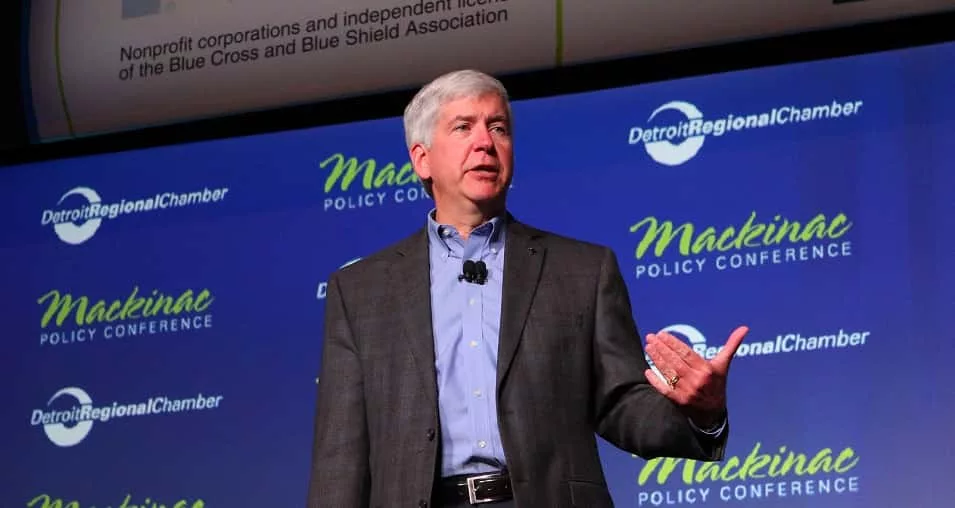Two words continue to sum up Michigan Governor Rick Snyder’s approach to the state budget: Fiscal Responsibility. The Governor unveiled his recommendation for the fiscal year 2018 budget today and the focus continues the precedent that has been set for fiscal responsibility and responsible investment over the past six years. The budget plan continues paving the path to a more prosperous future with key investments in economic development, talent development, infrastructure, education, and stronger, safer communities.
The overall budget includes $10.1 billion in general fund dollars, an increase of 1.75-percent compared to fiscal year 2017, and totals $56.3 billion, an increase of 2.5-percent.
The governor also offered a 2019 projected budget today, continuing his emphasis on long-term planning.
Said Snyder as he rolled out the plan, “This budget is a reflection on everything we’ve been able to accomplish over the past six years, and we should be proud of those achievements.” He continued, “Our economy is growing, our labor force is expanding, and our state’s fiscal house is in good shape. In the same spirit that has brought us this far, we need to continue making smart, responsible investments in critical areas like education, infrastructure, and the professional trades.” He concluded his message, saying, “In partnership with the Legislature, I look forward to once again finishing our budget early so we can continue our journey on the path to an even better Michigan.”
Lt. Gov. Brian Calley and State Budget Director Al Pscholka from Stevensville joined Snyder in outlining the budget recommendation to a joint session of House and Senate appropriations committees.
The Lt. Gov. said, “We have worked hard over the past six years to complete fiscally responsible budgets while investing in core areas, and this year’s budget is no exception.” He added, “Numerous economic indicators demonstrate that Michigan is on the right path. We need to stay on that path by continuing to make smart decisions that protect our residents and boost our economy for generations to come.”
A reformed tax code, strategic economic investments, and a renewed focus on talent development have helped to make Michigan’s comeback a model for the nation. The state’s economic climate continues to improve with almost 500,000 private-sector jobs added to the state since December 2010, making Michigan the leader in job growth in the Great Lakes region. Also, since December 2010, the state has seen its unemployment rate drop and remain near its lowest level in more than 15 years. Personal income growth continues to be positive and the state’s housing market now beats the national average with a 44-percent increase since 2010.
The new Budget Director, Pscholka, says, “This plan continues the strong tradition of making sure the budget is in balance for the long term.” He adds, “The recommendations announced today add to our savings account while addressing future liabilities and needed infrastructure investments in roads, facilities, and technology. And we do it all with a continued focus on ensuring one-time funding is not depended upon for ongoing costs in future years.”
To keep Michigan on this path to the future, highlights of the recommended budget include:
Investing in the 21st Century Economy
To continue building a strong Michigan economy, the governor today recommended more investments in business attraction and retention, as well as talent development:
- A total of $125.5 million for business attraction and community revitalization, an 8.7-percent increase from last year.
- A one-time allocation for talent marketing in the amount of $5 million dollars to support stronger career connections.
- To help Michiganders get the skills they need to meet the demands of incoming jobs, $40.9 million dollars would be invested in the Going Pro Program which helps ensure that we are training job seekers to be experts in their field of choice, whether it’s the professional trades, information technology, or other high-demand occupations. This is a 32% increase from the prior year.
Investing in a 21st Century Infrastructure
To address the state’s deteriorating infrastructure the Governor created the 21st Century Infrastructure Commission. The commission published a report assessing Michigan’s infrastructure and providing recommendations. Based on that input, the Governor makes the following recommendations to ensure a better Michigan is left for future generations:
- A $20 million deposit into the Michigan Infrastructure Fund as the start of a down payment on future infrastructure investments.
- An additional $2 million to implement the commission’s identified pilot for a statewide asset management database to better align and coordinate infrastructure needs.
- A $214.3 million increase over the FY 2017 levels for state and local roads, and $15 million for transit and rail programs.
Per-pupil K-12 Funding and Supporting At-Risk Youth
Gov. Snyder’s continuous strong support for K-12 education is clear in the recommended FY 2018 budget. The Governor also makes significant recommendations for aiding at-risk youth. The definition of at-risk students has been expanded for free and reduced lunch income eligibility, children in families receiving food (SNAP) or cash assistance (TANF), and migrant, homeless and foster care children. Among other things, the highlights include:
- An increase in per-pupil spending of $128 million, providing an additional $50 to $100 per pupil for schools, with an additional $50 per high school pupil to support the higher cost of educating high school students.
- An increase of $150 million, to a total of $529 million, to ensure that children in difficult financial situations are getting the help they need. All districts and public school academies will now be eligible to receive an additional $778 per pupil to assist at-risk students.
Higher Education Increases
Providing all of Michigan’s students with access to opportunities in higher education remains a top priority for the Governor. The recommended FY2018 budget includes increases in higher education funding, financial aid assistance, and scholarship and grant programs:
- An increase of $36.6 million for university operations, bringing total funding to $1.5 billion.
- An increase in financial aid and scholarships that total $18 million.
- A 10-percent or $5.3 million increase is included for the Tuition Incentive Program. The program supports about 18,500 students, aiding low-income Medicaid-eligible students with funding for an associate’s degree and up to $2,000 for baccalaureate work.
- A $2 million investment to reestablish the Independent Part-Time Student Grants program that targets adult students at community college who have completed at least 15 credit hours.
Assisting Michigan Families
Strong communities require healthy residents. Gov. Snyder recommends key investments to assist Michigan’s most vulnerable populations so they, too, can be on a clear path toward the future.
- An increase of $45 million to improve the quality and stability of the direct mental health care workforce, with an additional $7.2 million going to aid the state’s psychiatric hospitals. Planning is also recommended to build a new state psychiatric hospital.
- An increase of $3.7 million for the homeless emergency shelter program, which provides temporary shelter to displaced residents and assists the chronically homeless find permanent housing.
- Increased funding is also included for a clothing allowance, providing low-income families with $140 to $200 a year.
- The recommendation includes $6.8 million for food assistance through the “Heat & Eat” program.
- An increase of $11.3 million for improving staffing and service for the elderly and disabled at risk of abuse, neglect and exploitation.
- An increase of $5.6 million to support the Pathways to Potential program which positions state social workers inside school buildings to better serve the community.
Responding to Public Health Issues
Gov. Snyder’s recommended budget includes funding to help protect Michiganders from public health issues. Highlights include:
- A $6.8 million investment for drinking water quality programs, including lead prevention and toxicology response.
- A $3 million investment to contribute a state match for the federal Drinking Water Revolving Fund.
- An investment of $4.5 million for the statewide school drinking water quality program to help ensure our children have clean, safe water at school.
- A total of $4.9 million for the Vapor Intrusion Program to protect air quality from a threat that is growing nationally.
- Continued support for Flint’s recovery includes an additional $48.8 million.
Investing in Michigan’s Safety
Ensuring the safety and security of Michiganders has been a top priority for Gov. Snyder since he first took office, and this year’s budget proposal includes significant investments to continue efforts to increase safety in our state:
- A $9.2 million increase to train 100 additional state troopers, bringing the total number of enlisted Michigan State Police personnel to its highest level since 2003.
- An additional $7 million to further secure state networks and systems from unwanted intrusion.
- A $5 million investment for the public safety communications systems to keep our law enforcement officers connected during critical times.
Commitment to Natural Resources and Agriculture
In an effort to enhance Michigan for the future, Gov. Snyder has recommended numerous investments to support the state’s agriculture industry and natural resources:
- A $1.8 million investment to hire additional conservation officers.
- An investment of $19.5 million for state parks special maintenance.
- Also included is $5 million to the Department of Natural Resources’ Enhanced Challenge for Trail Development.
- An increase of $3.8 million to assist Wetland Mitigation Banking Program.
- A total of $3 million for agriculture development industry enhancement.
Decreasing the State’s Liabilities and Saving for the Future
Gov. Snyder’s record on fiscal responsibility is strong, and this budget recommendation is no different, providing future generations with confidence that the current fiscal policies are erasing past financial burdens.
- The Governor includes funding to lower the assumed rate of investment return for the state’s retirement systems from 8 percent to 7.5 percent. This more conservative assumption will require additional state investments into the retirement systems, helping to ensure that available funds will be sufficient to pay the benefits that have been earned. The state will reduce risk, remain on track to eliminate the liability entirely by the year 2038, and protect the retirement systems that many older Michiganders will be relying on in their senior years.
- A more than $260 million deposit into the state’s rainy day fund. When the Governor took office, the Budget Stabilization Fund balance was just $2 million. Through smart and responsible budgeting during the past six years, this new budget will see the rainy day fund balance soar to over $1 billion.
The state’s new fiscal year begins Oct. 1, 2017.






